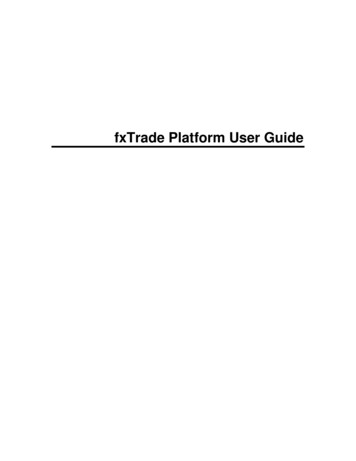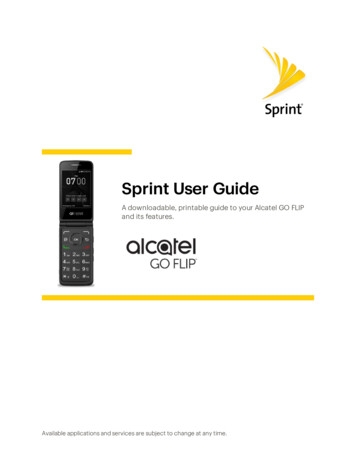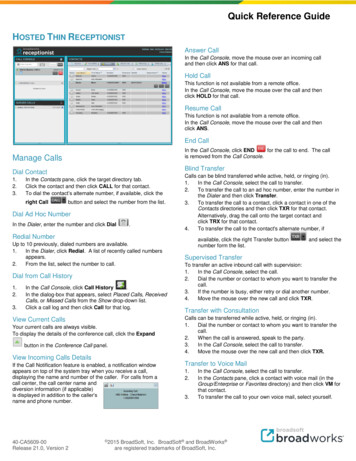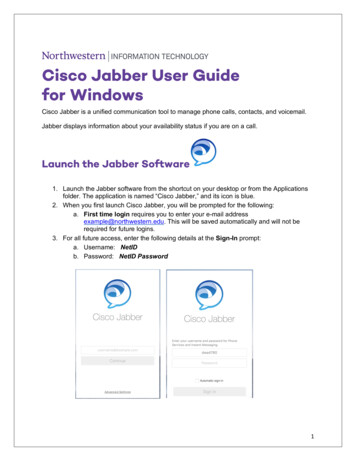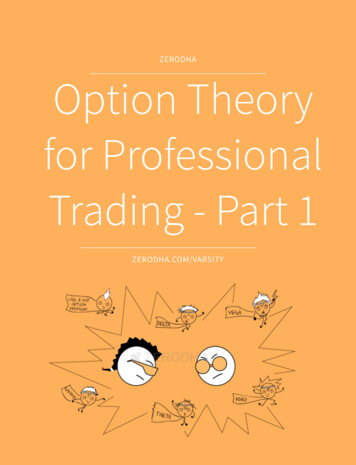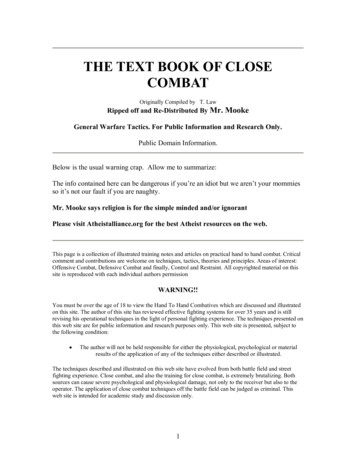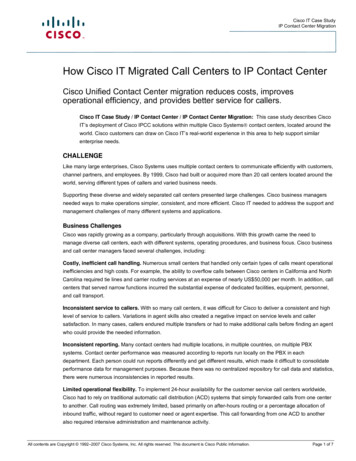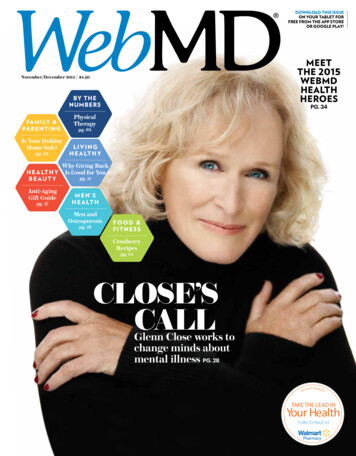
Transcription
WEBMD MAGAZINE DOWNLOAD THIS ISSUEON YOUR TABLET FORFREE FROM THE APP STOREOR GOOGLE PLAY!MEETTHE 2015WEBMDHEALTHHEROESNovember/December 2015 / 4.95BY THENUMBERSPhysicalTherapyFAMILY &PARENTINGpg. 62Is Your HolidayHome Safe?pg. 22H E A LT H YBEAUTYAnti-AgingGift Guidepg. 17PG. 34LIVINGH E A LT H YWhy Giving BackIs Good for Youpg. 11MEN’SH E A LT HMen andOsteoporosispg. 16FOOD &FITNESSCranberryRecipespg. 54CLOSE’SCALLNOVEMBER/DE CEMBER 2015Glenn Close works tochange minds aboutmental illness PG. 28ADVERT I S EM ENTTAKE THE LEAD INWEBMD.C OMYour HealthTURN TO PAGE 43
NOV/DEC 2015F E AT U R E SContents28Pg.34Pg.DownloadWebMD Magazinefor FREEon the App Store andGoogle Play.“Close’sCallSINCE IT’SSUCH ANISSUE INMY FAMILY,IT’S NOTSURPRISINGTHAT I’DBE ON THESPECTRUM OFDEPRESSIONSOMEWHERE.Glenn Close has earnednumerous awards andnominations for herroles in TV, movies, andtheater. But now, in hermost important role assister and advocate, sheraises awareness to changethe stigma tied to mentalillness with her nonprofitBring Change 2 Mind.This year, we honor Closeas the WebMD HealthHeroes People’s Choiceaward winner.“I N E V E RY I S S U EGreaterGoodPg.EDITOR’S NOTEOur 2015 HealthHeroes winnersEvery year, WebMDcelebrates Americanswho change the healthlandscape in our country.This year, we honorwinners in four categories:scientist, prodigy,advocate, and People’sChoice. Meet the 2015WebMD Health Heroes.Cover photograph by Richard Phibbs4Pg.72TAKE 1034NOV/DEC 2015272We b M D . C O MRon Howard knowsabout sea changes—inhis latest movie andin life. He reflects onhis career, long-lastingmarriage, and healthylifestyle.
ContentsNOV/DEC 2015H E A LT H Y S TA R T07Pg.0011Pg.0017Pg.0022Pg.0054Pg.HOT TOPICS: Can spicy food really help you live longer? Do rude coworkers make you rude, too? What can you do to prevent the flu? Findout and get more news you can use.L I V I N G H E A LT H YWEBMD ON THE STREET: Our experts take the reins and deliver thegift of healthy tips to Santa Claus. WOMEN’S HEALTH: Did you knowvolunteering can boost your health? MIND MATTERS: The key tokeeping your memory sharp is a better vocabulary. Here’s how improveyours. MEN’S HEALTH: Osteoporosis isn’t just for women. Bone up onhow it affects guys, too.H E A LT H Y B E A U T YYOU ASKED: Need gift ideas for the beauty mavens on your holidaylist? Look no further than our expert’s anti-aging gift guide. BEAUTYSMARTS: The expert’s guide to makeup removal. YOUR SMILE: Doyou have chronic dry mouth? PLUS: Dirty Secret, Beauty 411, andAisle Do.F A M I LY & PA R E N T I N GPET HEALTH: Sophia Bush to the rescue! The actor opens up about herpuppy loves. PREGNANCY: Baby is getting ready, but are you? Checkoff these five to-dos before the big arrival. KIDS’ HEALTH: Do you spoilyour kids with gifts? How to change the focus this holiday season. PET HEALTH: Can your four-legged friend get the flu? Know thesymptoms and find out if your pooch is at risk. BABY TALK: Candles,lights, and trees, oh, my! Baby-proof your house for the holidays.FOOD & FITNESSIN SEASON: Get bogged down in the kitchen. We've got three cranberryrecipes that will add sparkle and nutrition to your holiday table. OFF THE MENU: Georgia chef Hugh Acheson puts vegetables in thespotlight year-round. WORK IT OUT: How to score a discount on gymmemberships. FITNESS CHALLENGE: Three fitness gifts that will helpyou start the year off on the right foot.WEBMD CHECKUP60Pg.Crohn’s disease and ulcerative colitis awareness HEALTH HIGHLIGHTS: Live healthywith type 2 diabetes. BY THE NUMBERS: A closer look at COPD. ADVOCACY: A Q&Awith Seth Rogen and his wife Lauren about Alzheimer’s awareness. MY STORY: Areader shares how she overcame postpartum depression. LIVING WELL: Learn whatto do when you have TMD. SEASONAL HEALTH: Caring for your baby with a cold orthe flu. HEART HEALTH: Heart rate myths debunked. BY THE NUMBERS: A closerlook at physical therapy. HEALTH CHECK: Take this quiz on back pain. TEST YOURSMARTS: A quiz on adult incontience. HEALTH HIGHLIGHTS: Keep your home andfamily safe this season.We b M D . C O M3NOV/DEC 2015
E D I TO R’ SN OT EWATCH OUR EXCLUSIVE VIDEOWITH GLENN CLOSE!Access Now!12Download the free DigimarcDiscover app, available at iTunesand Google Play.Open the app. Hold your device4 to 7 inches away from theactivated icon (shown at right) toscan it. Your phone will alert youwhen Digimarc Discover recognizesthe image.Look for thisicon on pagesthroughoutthe magazine.3Your browser will open todisplay a Web page where youcan access WebMD articles, videos,slideshows, and more content ordownload WebMD apps.CONNECT WITH US!Subscribe to a newsletter!webmd.com/newslettersLike WebMD!facebook.com/webmdDownloadWebMDMagazinefor FREEon theApp Storeand GooglePlay.Tweet us!twitter.com/webmdPin with us!pinterest.com/webmd/webmd-magazineKristy HammamEditor in Chiefkristy@webmd.comEmail the editors!webmdmagazineeditors@webmd.netWe b M D . C O M4NOV/DEC 2015TOP LEFT: GREGORY MILLER;MILLER LORENZO CINIGLIOThe term hero tends to be used agreat deal, but it’s not a word wetake lightly when referring to our WebMDHealth Heroes award winners. Theinspiring group of individuals featured inthis issue are giving of themselves, oftenmaking great sacrifices, to not only helpothers but also to improve health care forall of us.Each of our 2015 award winnershas worked to help those affected byconditions of the often unchartedterritory of the mind. Our scientistwinner, Dr. Bennet I. Omalu, discovereda disease of the brain caused by repeatedhead trauma and was the first to identifyit in a former NFL player. Our prodigy,teenager Kenneth Shinozuka, inventeda device to help track the movements ofAlzheimer’s patients. Advocate winner,Ronald “Jake” Clark, founded a programto help veterans crippled by PTSD. Andour People’s Choice winner, GlennClose, works to help everyone have abetter understanding of mental illness.Turn to page 28 to read the compellingstories of Close, and our other threewinners.Wishing you much joy this holidayseason.Good Morning America co-anchor Robin Roberts, host of our2015 WebMD Health Heroes awards ceremony on Nov. 5, sat down withthis year’s People’sChoice winner, GlennClose. They discusshow Close’s ownpersonal experiencewith her sister ledher to found BringChange 2 Mind, anonprofit groupdedicatedto endingthe stigmasurroundingmental illness.
111 EIGHTH AVE., SUITE 700, NEW YORK, N.Y. 10011EDITOR IN CHIEFVanessa CognardEDITORIAL DIRECTORDIRECTOR, BUSINESSOPERATIONSColleen ParettySENIOR EDITORSylvia DavisKeeps You Informedand Your Baby Healthy.WEBMD.COM SENIOR DIRECTOR,EDITORIALStephanie SnipesCHIEF MEDICAL EDITORMichael W. Smith, MDMEDICAL EDITORSBrunilda Nazario, MD;Hansa Bhargava, MD;Arefa Cassoobhoy, MD, MPHCONTRIBUTING WRITERSChristina Boufis, SonyaCollins, Heather Hatfield,Jodi Helmer, Ayren JacksonCannady, Katherine Kam,Lauren Paige Kennedy,Matt McMillen, ErinO’Donnell, Gina Shaw,Stephanie WatsonnnAccess hundreds of articlesand videos developed andapproved by WebMD doctors.Manage schedules forsleeping, feeding, diaperchanges and growth.Create a digital baby book andshare photos and videos, plustag them with milestones.Kathleen CusackSALES OPERATIONS ANALYSTKisha JacksonADVERTISING SALESCHICAGOTracy Kennedytkennedy@webmd.net312-416-9275Anna Novingeranovinger@webmd.net312-416-9278CHIEF EXECUTIVE OFFICERCHIEF FINANCIAL OFFICERPeter AnevskiPRESIDENTCO-GENERAL COUNSEL &SECRETARYEXECUTIVE VICE PRESIDENT,CHIEF OF CONSUMER STRATEGYnSENIOR DIRECTOR, MARKETINGDavid J. SchlangerSteven L. Zatz, MDKeep allyour baby’spreciousinformationin one place.Mathew ReyndersWEBMD.COM ART DIRECTORNoel TriplettnPUBLISHERKristy HammamDoug WamsleyCO-GENERAL COUNSELLisa Ryan HowardMichael GlickEXECUTIVE VICE PRESIDENT,SALES AND MARKETINGCHIEF COMMUNICATIONSOFFICERMichael FogartyAdam GrossbergNEW YORKClaudia Ferncfern@webmd.net212-624-3728Patria Rodriguezprodriguez@webmd.net212-417-9542John Schaetzlejschaetzle@webmd.net212-624-3787WEST COASTNicole Jonesnjones@webmd.net213-718-5550SOUTHEASTCourtney CofieldWNP Mediacourtney@wnpmedia.com770-569-8188SENIOR VICE PRESIDENT,PRODUCT MARKETINGYiatin ChuVICE PRESIDENT, SALESDEVELOPMENTRobyn Mait LevineVICE PRESIDENT, FINANCEJames McCannDIRECTOR, POLICY &GOVERNANCETheresa SaladinoEDITORIAL, DESIGN, PRODUCTION MANAGEMENTEDITOR AT LARGEART DIRECTORPRODUCTION ARTISTKim CavinessMelissa H. MillerBrenda M. WaughDEPUTY EDITORPHOTO EDITORCOPY EDITORAndrea GabrickKatie EllsworthSharon K. CongdonSENIOR VICE PRESIDENT,MANAGING EDITORPRODUCTION DIRECTORRebecca ScherrConnie OttoBOOKINGS DIRECTORPRODUCTION MANAGERWendy Zipes Hunterwendy@celebrity-concepts.comJudi ShefferADVERTISING TRAFFIC MANAGERMARKETING SERVICESJoanne LoPintoSENIOR MARKETING MANAGERLaura CassellaTommy DingusCUSTOMER SERVICE & SUBSCRIPTIONSMEDICAL PROFESSIONALS To manage your subscription, go to WebMD.com/magazine/subscribe.READERS Download WebMD Magazine on your iPad or Android device for free.Go to the App Store (apple.com) or Google Play (googleplay.com).Comments? Questions? Go to CustomerCare.WebMD.com or“Contact Us” at the bottom of every page on WebMD.com.WebMD Magazine is distributed to doctors’ offices throughout the U.S., online at WebMD.com, and by download from the App Store or Google Play. WebMDMagazine is not responsible for advertising claims. WebMD Magazine (ISSN 1553-9946), Vol. 11, No. 8, is published by WebMD, LLC and may not bereproduced in whole or in part without written permission of WebMD, LLC. All editorial content is reviewed by our board-certified physicians, is for informationalpurposes only, and is not intended to be a substitute for professional medical advice, diagnosis, or treatment. WebMD does not endorse any specific product,service, or treatment. Always seek the advice of your health care provider with any questions regarding a medical condition and never disregard professionalmedical advice or delay seeking it because of something you have read in WebMD Magazine. If you think you have a medical emergency, call your doctor or911 immediately. 2015 WebMD, LLC. All rights reserved.
WebMD IS HONORED TO CELEBRATE THE 2015Individuals Working to Improve Health and Wellness in AmericaADVOCATERONALD “JAKE” CLARKCreator and Executive DirectorSave A Warrior, Malibu, CaliforniaPEOPLE’S CHOICEGLENN CLOSEAward-winning Actor and ActivistFounder, Bring Change 2 Mind, San Francisco, CaliforniaPRODIGYKENNETH SHINOZUKASenior, Horace Mann School, Bronx, New YorkSCIENTISTBENNET I. OMALU, MD, MBA, MPHForensic Pathologist, Neuropathologist, EpidemiologistChief Medical Examiner, San Joaquin County, CaliforniaAssociate Clinical Professor of Pathology, University of California, Daviswebmd.com/healthheroes#HealthHeroesProudly SuPPorted byPhotography: Ronald “Jake” Clark and Kenneth Shinozuka by Thomas Alleman; Glenn Close by Richard Phibbs; Bennet I. Omalu, MD, by Robert Houser
H E A LT H YS TA R THOT T OP I C S!FACTS AND NEWS YOU CAN USEMostpopular snackpurchasedduring theholidays: candy.CHOCOLATERANKS NO. 1among candybuyers,followed bycandycanes.Source: NPD Group13FROM TOP LEFT: LEW ROBERTSON/GLOW IMAGES; FUSE/GLOW IMAGES; PK-PHOTOS/GETTY IMAGES; SBAYRAM/GETTY IMAGES;TOMAS RODRIGUEZ/GETTY IMAGES; ZIGA LISJAK/GETTY IMAGES; SCOTT HANCOCK/GLOW IMAGES; ZIGA LISJAK/GETTY IMAGESinNumber of livessaved sincetobacco controlefforts launchedin the 1960sNUMBEROFPEOPLEWITHHIGHBLOODPRESSUREIN THEU.S.Source: American LungAssociationSource: National Heart,Lung, and Blood Institute8 MILLION9,3407–10 DAYS:HEALINGTIMEFOR ATATTOOTravelingthis holidayseason?Watch out forbedbugs—75% ofexterminatorsreport findingthese pestsin hotels.Bedbugs livein every state,and they caneat seventimes theirown weightin blood.Source: American Skin AssociationAMERICA’S MOSTPET-FRIENDLYCITIES:CINCINNATIST. LOUISCOLORADOSPRINGS, COLO.TAMPA, FLA.RICHMOND, VA.More than halfof Americanssay they try toavoid soda (dietand regular)and sugar.Source: GallupSource: WalletHub40%-90%of peoplewho wear contact lensesdo not care forthem correctly.Source: CDCSource: National PestManagement Association65.7 millionAmericans—29% ofadults—carefor a sick,disabled,or elderlyloved one.Estimated number ofTRICYCLE ACCIDENTS treatedin U.S. emergency roomsfrom 2012 to 2013Source: Family CaregiverAllianceSource: PediatricsNOV/DEC 20157We b M D . C O M
H E A LT H YS TA R T23INSource: JAMAFLU FIGHTThe flu will try to knockyou off your feet thisseason. Don’t go downwithout a fight. First,get a flu shot, whichwill slash your chancesof getting sick. Thenwash your hands oftenand keep them awayfrom your eyes, nose,and mouth—that’s howviruses get in. If you doget the flu and your doctor prescribes antivirals,take them. They canmake your symptomsmilder and yoursickness shorter.Source: CDCSTEP TO ITPicky Eaters“Yuck!” is typical dinnertime talkwhen kids are at the table. Butif your child is super picky, thatmight not be because she’s justbeing willful. A recent study of kidsages 2 to 6 finds that finicky eatersmay be more sensitive than otherchildren—and not only to foodtastes and textures. In the study, thepickiest eaters were more likely toshow signs of anxiety, depression,and attention deficit hyperactivitydisorder then and later in life. If youhave concerns about your choosychild, talk with your pediatrician.Source: PediatricsBRAIN BOOSTIt’s time to stand upfor yourself. In anexperiment, adults ages36 to 80 wore activitytrackers that detectedwhen they were sitting,standing, or stepping,24 hours a day for sevendays. Those in the studywho stood up or movedaround the most hadseveral signs of betterheart health. Replacingtwo hours sitting perday with standing cansignificantly lowerblood sugar and badcholesterol while raisinggood cholesterol.Replace that sitting withstepping, and you couldsee all those resultsplus a smaller waist andlower body mass index.Source: European Heart JournalFor people at risk for Alzheimer’s disease, exercise can help boost brainhealth. Adults ages 55 to 89 with mild cognitive impairment—a risk factor forAlzheimer’s—were divided into groups that did either high-intensity aerobicsor low-intensity stretching. They exercised 45 to 60 minutes, four times aweek. After six months, the aerobic group had reduced levels of tau,an abnormal protein that builds up in the brains of people withAlzheimer’s. Blood flow increased in the memory and processingcenters of their brains, and attention, planning, andorganization tasks improved.Source: Alzheimer’s AssociationWe b M D . C O M8NOV/DEC 2015FROM LEFT: BRIAN HAGIWARA/GLOW IMAGES; ROCIO ALBA/EYEEM/GETTY IMAGES; TERRY VINE/GLOW IMAGESNUMBER OFAMERICANSWHO AREOVERWEIGHTOR OBESE
JUMPSTARTSPICEFOR LIFEBring on the spice! Itmight prolong your life.Researchers in Chinatracked nearly 500,000adults ages 30 to 79 forseven years. During thoseyears, those who ate hot,spicy foods once a weekor more were less likelyto die prematurely thanthose who didn’t. Overalldeath risk was reducedand so was the risk ofdeath from heart andrespiratory diseases andcancer. And the morespice, the better. Thosewho ate spicy foods everyday were the least likelyto die during the study.CLOCKWISE FROM LEFT: TIM HAWLEY/GETTY IMAGES; BALLY SCANLON/GETTY IMAGES; DNY59/GETTY IMAGES; FUSE/GLOW IMAGESSource: British Medical Journal2Copy ThatWhen a co-worker gets sick,you know you could be next. The sameis true when a co-worker is rude. In anexperiment, business students practiced negotiatingwith partners. When the students rated their partners asrude, they were more likely to perceive their next partner asimpolite, too. Then they responded rudely in return.Bad manners can even infect bystanders. In another test,business students watched a video of either a rude orneutral professional interaction. Later they responded toneutral-toned client emails. Those who had seen the uncivilinteraction were more likely to reply with hostility.Source: Journal of Applied PsychologyNumber of times perdecade adults age 30 andolder get the flu. Kids getit about every other year.Source: PLOS BiologyFAT ZAP.comHot HitsWhat’s trending onWebMD.com right now*Vitamin B12What happens in aconcussion?Fast weight lossAsperger’s SyndromeAfter menopause, maintaining a healthyweight can be difficult. Unfortunately, extrabody fat after “the change” can increase yourrisk for breast cancer. Longer workouts mightbe the key to staying lean. In a study of 400previously inactive, postmenopausal women,those who exercised for 40 minutes a day lostmore fat than those who got the nationallyrecommended 20 minutes a day. Althoughboth groups lost the same amount of weight,the ones who worked out longer lost moretotal fat, belly fat, and inches off their waist.Symptoms of depressionSource: JAMA Oncology*as of Oct. 1, 2015What do retinoids do?Strep throatHealthy fatsHow do you get warts?As we have since2006, we celebrateanother exemplarygroup of WebMDHealth Heroes in thisissue. You’ll meetthis year’s honorees,starting on page 34,and learn what our2014 winners havebeen up to since theywere honored. Youcan also read aboutthe inspiring candidates in the People’sChoice category.All make vital contributions that reachand improve the livesof so many people—this is what we meanby “health hero.” Weare so proud of eachand every one.Our Health Heroesselection team worksthe better part ofeach year to find,research, evaluate,and finally selecteach winner—withthe exception ofthe People’s Choicehonoree, who reallybelongs to you whenyou vote for yourfavorite celebrityhealth advocateeach August.We’ll start oursearch for the 2016Health Heroescandidates early inthe new year, and asalways, we welcomeyour suggestions. Ifyou know of someone doing somethingextraordinary inhealth or medicine,drop me a line.Meanwhile, happy,healthy holidays,Immune-boosting foodsCold feetExercise for beginnersColleen ParettyEditorial Directorcolleen@webmd.com
LIVINGH E A LT H YNature’sCallA walk through the woods may be aboon for your mental health. A newstudy suggests that spending time ina natural setting can keep negativethoughts at bay and ward off mentalillness. In the study, published inProceedings of the National Academy ofSciences, people who took a 90-minutewalk through a natural setting reportedfewer negative thoughts than those whostrolled in an urban environment. Youcan benefit from connecting with naturein many ways, says Ellen Albertson,PhD, a psychologist and certifiedWellcoach. Walk through a park, forest,or botanical garden. Plant a smalltree. Go birding. Lay out a blanketand gaze up at the stars. The trick is tobe mindful. “Leave your cellphone athome or in your car, find a place youare drawn to, relax, and observe yoursurroundings,” Albertson says. Smellthe trees. Observe the changing leaves.And don’t let a dip in temperaturehold you back. Dress in layers. Properfootwear, a hat, and gloves will keep youwarm and dry.—Kara Mayer RobinsonPhotograph by Sean De Burca/CorbisNOV/DEC 201511We b M D . C O M
Santa’sSecretsLIVINGH E A LT H YBREATH DEFENSE“The first thing you should do ismake sure you brush and floss afterevery meal, as the greatest sourceof bad breath is gum disease.Brushing or scraping your tonguecould also temporarily help reducebad breath. And, with your longholiday hours, be sure to stay wellhydrated, since dry mouth can be acause of bad breath.”We pound the pavement toget expert answers to yourpressing health questionsPhotograph by Chuk NowakHEALTHY HABITEric Yabu, DDS“If a child looks sick, don’t gettoo close. Flu and cold virusescan spread when a child talks orcoughs and droplets land on you,or you breathe them in. Get in thehabit of not touching your faceso germs on your fingers don’tenter your eyes, ears, or mouth.And use an alcohol-based handrub between each child to keepeveryone healthy.”Lim and Yabu Advanced TechnologyDentistry, Oakland, Calif.Arefa Cassoobhoy, MD, MPHWebMD medical editorHAPPY MEALWEBMD ON THE STREET“Temptations are at their peakwhen you’re hungry. Resist thecookies by fueling up with ahealthy meal before you get towork, and stash snacks to keepup your energy level throughoutthe day. Best bets include proteinand fiber to keep you feeling fullfor several hours. Try Greek yogurttopped with whole grain cereal,berries, and nuts; a veggie omeletand whole grain toast; or an appleand chunky peanut butter.”Tom ValentKathleen Zelman, MPH, RD, LDWebMD director of nutritionLIFT TICKET“I recommend having a step nearyou so the children can be as highand close to you as possible beforeyou lift them. Have the parents putchildren on your lap whenever theycan. When you sit for long periods,use lumbar or low-back support.Put padding on your thighs and sitthe children on alternate legs.”Mary Ann Wilmarth,PT, DPT, OCSCEO, Back2Back Physical Therapy,BostonSanta, 65Midland, Mich.Want to be the nextWebMD on the Streetstar? Tweet us yourhealth issues at@WebMD. We mightcome to your city!Some boys want to be firemen ordoctors when they grow up, butTom Valent had other ambitions.“Santa used to come to our houseevery year,” he says. “Man, I gotexcited. It was a wonderful part ofmy childhood. I thought if I couldmake people happy doing that, itwould be a great thing.” In his 20she donned the signature red suit andwhite beard, playing Santa for hisfriends’ children and at a local mall.Today, he teaches other aspiringSantas the tricks of the jolly tradeas dean of the Charles W. HowardSanta Claus School—the world’soldest continuously operating Santaschool. Valent wants to give everychild an unforgettable visit, but hecould do without the germs theysneeze and cough into his beard. “Iget a flu shot each year. What elsecan I do to avoid getting sick?” Theproximity also makes oral hygienea priority. “The kids who sit on mylap get very close to my face. Howdo I keep my breath fresh?” heasks. Though Santa is known forhis rotund belly, Valent wants tostay healthy to perform at his best.When kids bring him cookies—asthey often do—“How do I avoid thetemptation?” Lifting children ontohis knee is another hazard thatputs strain on his back and knees.Still, he wouldn’t trade the job foranything. “It’s a great privilege,” hesays. “People love Santa. He’s themost well-known character in theworld.”—Stephanie WatsonTHE OPINIONS EXPRESSED IN THIS SECTION ARE OFTHE EXPERTS AND ARE NOT THE OPINIONS OF WEBMD.WEBMD DOES NOT ENDORSE ANY SPECIFIC PRODUCT,SERVICE, OR TREATMENT.
Make healthy habits stick.Get the WebMD app for ondemand healthy living tips.LIVINGH E A LT H YLEARN HOW ON PAGE 4FEELINGGOODHERE ARE THEBEST WAYS TO GETTHE MOST OUT OFVOLUNTEERING, SAYSSTEPHEN POST, PHD:WO M E N ’S H E A L T HHelp WantedRESEARCH SHOWS THAT VOLUNTEERING IS GOOD FOR YOUR HEALTHNANCY HONECUTT/GETTY IMAGESBy Lisa MarshallIf you’ve ever served Thanksgivingdinner at a homeless shelter, rung thebell for the Salvation Army, or written acheck to a favorite charity, you probablyrecall the calm glow of satisfaction socialscientists call the “helper’s high.” Butdo such acts of generosity have lasting physical benefits?Yes, says Stephen G. Post, PhD, a professor of preventive medicine at Stony BrookUniversity and author of The Hidden Giftsof Helping: How the Power of Giving, Compassion, and Hope Can Get Us Through HardTimes. Recent studies show people who volunteer regularly have healthier hearts, lesschronic pain, and bolstered immune systems. They battle addiction better and areless likely to suffer dementia with age. Theyalso live longer. “The science is exploding,”Post says. “We have begun to discover thatthere is something going on, physiologically,in this process of helping others that makespeople not only feel happier but also reportgreater health.”As far back as 1988, an informal analysisof 1,700 female volunteers found that 68%reported a sense of calm after volunteering, akin to what they got from exercise.Decades later, studies used magnetic resonance imaging (MRI) to track brain activityto explain why. One NIH study of 19 peoplefound that merely cutting a check to charitylights up the mesolimbic reward system (thesame brain region that fires when we eat,have sex, or receive money), igniting a floodof dopamine and other feel-good chemicals.When that generosity is practiced face-toface, levels of oxytocin (the calming hormone released when a mother nurses herinfant) and pain-killing endorphins alsorise, Post says.Meanwhile, as we shift our minds awayfrom our own troubles to focus on others’ needs, levels of stress hormones likecortisol—long known to be hard on the cardio vascular system—fall. One 2013 studyof 1,654 older adults found that those whovolunteered at least 200 hours per year were40% less likely to develop high blood pressure than non-volunteers.An evolutionary reason may explain whyour reward centers light up when we helpsomeone else. Working in a team, Postand others say, could very well have helpedus survive as a species. Some even suggest women’s innate tendency to “tend andbefriend” rather than fight or fly in times ofcrisis could, by buffering stress hormones,partially account for why women live longerthan men.NOV/DEC 201514We b M D . C O MHelp others getthrough somethingyou’ve gone through.Studies showrecovering alcoholicsare twice as likely tostay sober when theyhelp other recoveringalcoholics, andchronic pain suffererssee their paindecrease when theyhelp someone with asimilar condition.Do what you’regood at. Whenvolunteers feel likethey’re just in the way,the experience canbackfire and boosttheir stress. Choose avolunteer opportunitywhere you can make areal contribution.Mean it. Thosewho contribute toorganizations they’repassionate about seestronger physiologicalresponses.“Motivation matters,”Post says. “Whenpeople are genuinelyaltruistic in theiractions, they have abetter response.”Reviewed byBrunilda Nazario, MDWebMD Lead Medical Editor
LIVINGH E A LT H YM I N D M AT T E R SWord PlayWANT TO KEEP YOUR MEMORY SHARP? IMPROVE YOUR VOCABULARYBy Kara Mayer RobinsonPOP QUIZQUIZZING YOURSELFON YOUR NEWLYACQUIRED WORDSCAN CEMENT THEIRMEANINGS AND HELPYOU OWN THEM FORGOOD. TRY THESETESTING TIPS FROMSHARON GREEN.Make flashcards. Asyou discover a newword, write it on aflashcard. On theback, jot down thedefinition. You canalso write down thephonetic spelling.Ask a friend or familymember to quiz you.Listen to smart people.You can even up the ante bytuning into television andradio shows with a higherbar. “As I listen to NPR onmy daily commute to work,I often hear words thatI’ve taught to my collegestudents,” Green says.In fact, Green discovered that letting her teendaughter tune into British sitcoms exposed her tomore SAT-worthy vocabwords than typical American shows.Use your new words.Last but not least—whenyou pick up a new word,use it! “This is vital,” Greensays. The rule of thumb: Ifyou use it three times, it’syours.Read the definition and—presto!—you’ve got it.Read for fun. You maynot realize it when you’redoing it, but reading is agreat way to upgrade yourspeech. Green says manyavid readers pick up newwords all the time, without being told what themeanings are. “Repeatedexposure to a word throughregular reading gives youa feel for how and when touse the word,” she explains.Talk to smart people.“Look for opportunities totalk with people who use abroader vocabulary,” Greensays. As you hear a widerrange of words, you automatically absorb them andstore them for later use.We b M D . C O M15NOV/DEC 2015Plug them in. Make alist of new words andtype them into a wordquiz or game websitelike quizlet.com. You’llget custom-madequizzes and games totest your knowledge.Keep at it and do itoften.Get a calendar. Get atear-off, word-of-theday calendar. Beforeyou glance at thedefinition, try to makean educated guess atthe meaning. Collectthe torn-off pages. Atthe end of the week ormonth, quiz yourselfon the meanings.Use it in a sentence.After you learn themeaning of a newword, use it in asentence. Write itdown on paper or finda way to work it intoconversation.Reviewed byHansa Bhargava, MD,WebMD Medical EditorBILL MILES/GLOW IMAGESLearning new wordsmay do wonders foryour brain. A recent studysuggests having a richvocabulary can ward offcognitive decline. Manyexperts agree that activitiesthat engage your mind maykeep you sharper longer.Boosting your word countcan be fun and easy. Trythese tips from SharonGreen, who teaches vocabulary at Niagara Universityin upstate New York.Read the news everyday. Whether it’s your localnewspaper or The New YorkTimes digital edition, themore words you exposeyourself to every day, thebetter. Don’t skip overwords you don’t recognize.Try to use the context todecode the meaning. Orhighlight the word and lookit up in a dictionary whenyou’re done.Visit a vocab website.Vocab sites are packed withnew words, challenges,games, and quizzes. Youcan even sign up to have anew “word of the day” delivered to your inbox. Someto try: m-w.com/game,vocabulary.com, dictionary.com, and y.Leaf through a dictionary. Seriously, thiscan be fun. You may besurprised how many wordsjump out at you that you’refamiliar with but don’tquite know the meaning of.
Want more news like this?Sign up for the Men’s HealthNewsletter at WebMD.com.LIVINGH E A LT H YLEARN HOW ON PAGE 4MEN’S HEALTHStrong HoldMAKE NO BONES ABOUT IT— OSTEOPOROSIS ISN’T JUST FOR WOMENMany men mightthink of osteoporosisas a woman’s disease, if theythink about it at all. Don’tmake that mistake and putyourself at risk of brokenbones—or worse.“If a man falls and breakshis hip, he’s more likely thana woman to have a majorcomplication from it, including death or being confinedto a wheelchair,” says GiseleWolf-Klein, MD, director ofgeriatric education at NorthShore-LIJ Health System inNew Hyde Park, N.Y.The bone-thinning disease affects up to 2 millionaging men, while as many as13 million men have its precursor, osteopenia, or lowbone-mineral density. WolfKlein recently co-authoreda study tha
WEBMD MAGAZINE NOVEMBER/DECEMBER 2015 * WEBMD.COM MEET THE 2015 WEBMD HEALTH HEROES PG. 34 Glenn Close works to change minds about mental illness PG. 28 CLOSE’S CALL MEN’S HEALTH Men and Osteoporosis pg. 16 BY THE NUMBERS Physical Therapy pg. 62 FAMILY &
